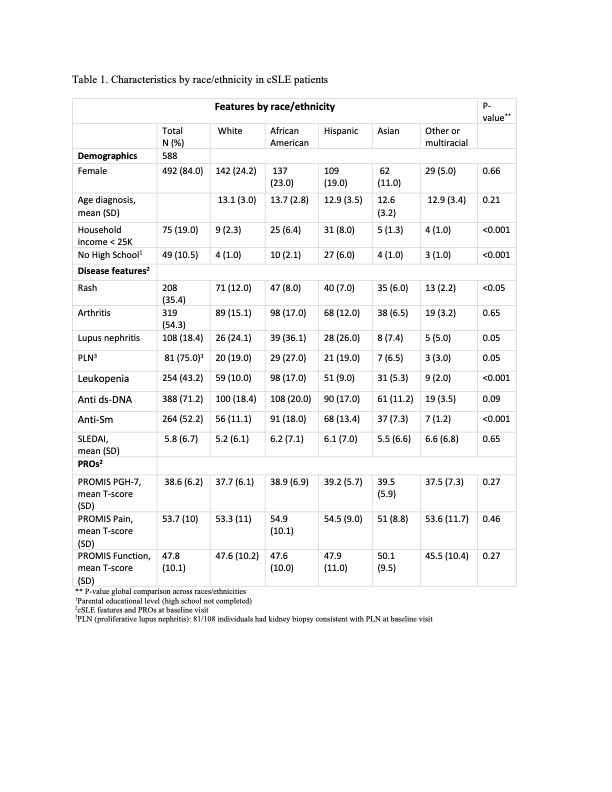Session Information
Date: Sunday, November 7, 2021
Title: Pediatric Rheumatology – Clinical Poster II: SLE, JDM, & Juvenile Scleroderma (0764–0785)
Session Type: Poster Session B
Session Time: 8:30AM-10:30AM
Background/Purpose: The association of race/ethnicity with childhood-onset systemic lupus erythematosus (cSLE) outcomes has been well described, with non-White individuals experiencing a more severe disease phenotype including increased damage accrual and higher rates of renal involvement. However, there are limited data regarding patient-reported outcomes (PROs) across race and ethnic groups in cSLE. This study assesses the association of race/ethnicity with Pediatric Global Health [PGH-7], Pain Interference, and Physical Function Mobility as measured by the Patient-Reported Outcomes Measurement Information System (PROMIS®) in cSLE patients at enrollment in the Childhood Arthritis and Rheumatology Research Alliance (CARRA) Registry.
Methods: The CARRA Registry is a convenience cohort of pediatric patients with rheumatic diseases including cSLE. Sites are primarily North American. This study included cSLE patients enrolled in the CARRA registry within two years from cSLE diagnosis between May 2017 to January 2020 who met ≥ 4/11 ACR classification criteria and/or ≥ 4/11 SLICC classification criteria for lupus. Baseline demographics, laboratory, and disease features as well as PROs were obtained. Analysis of variance (ANOVA) was used to assess the difference in the PROMIS summary T-score means across races/ethnicities. Relationships between SLEDAI and PRO scores were analyzed using Pearson’s correlation coefficients. Multivariable linear regression analysis was used to examine the association of race and ethnicity with PROMIS scores at baseline. P-values < 0.05 were considered statistically significant.
Results: At the time of data extraction, 588 cSLE patients met inclusion criteria: 84% were female, 24.2% non-Hispanic White, 23% African American, and 19% Hispanic. The mean age at diagnosis was 13.2 years (SD 3.1). Household income and highest parental education varied by race/ethnic group, as did frequency of rash, leukopenia, and positive anti-Sm antibody (Table 1). The cohort had low-moderate baseline disease activity, with a mean SLEDAI of 6.14 (SD 6.8). There was no difference in disease activity across races/ethnicities in one-way ANOVA analysis. The overall PROMIS PHG-7 mean T-score was 38.6 (SD 6.4), which is more than 1 SD below the general population mean of 50. The mean Pain Interference T-score of 54 (SD 10) was slightly above, and the Physical Function Mobility mean T-score of 47.5 (SD 10.13) was slightly below the population mean of 50. There was a negative moderate correlation between PROMIS Pain Interference and Physical Function Mobility (Pearson correlation coefficient: – 0.52). There was no association between race/ethnicity and PROMIS scores in multivariable linear regression analysis.
Conclusion: In this large multiethnic CARRA pediatric lupus cohort, global health (PGH-7), pain interference, and physical function mobility as measured by PROMIS did not vary across races/ethnicities. The relatively low baseline disease activity may explain this lack of association. Long-term follow-up data is needed to assess for associations between PROs and race/ethnicity over time.
To cite this abstract in AMA style:
Borgia R, Gurka M, Filipp S, Elder M, Cardel M, Shiff N. Race, Ethnicity and Patient-Reported Outcomes in Childhood-Onset Systemic Lupus Erythematosus [abstract]. Arthritis Rheumatol. 2021; 73 (suppl 9). https://acrabstracts.org/abstract/race-ethnicity-and-patient-reported-outcomes-in-childhood-onset-systemic-lupus-erythematosus/. Accessed .« Back to ACR Convergence 2021
ACR Meeting Abstracts - https://acrabstracts.org/abstract/race-ethnicity-and-patient-reported-outcomes-in-childhood-onset-systemic-lupus-erythematosus/

